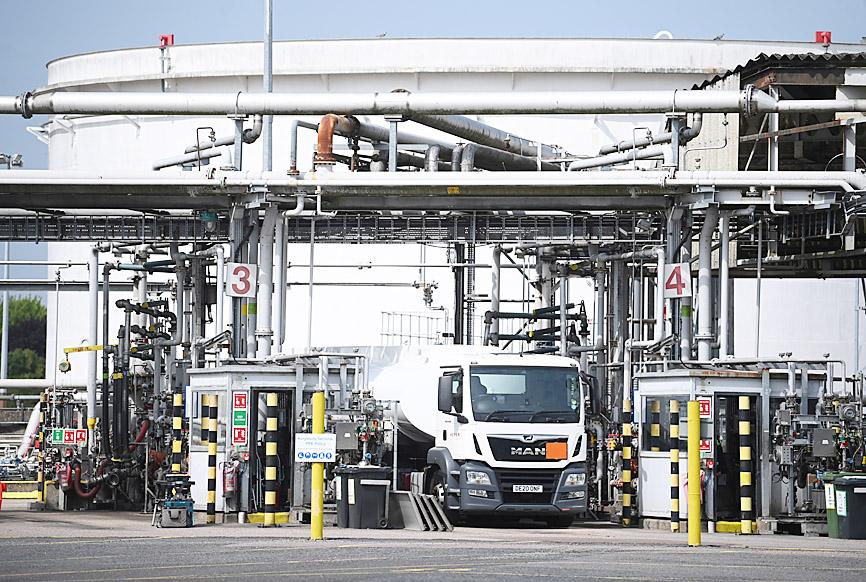Oil fell for a second consecutive month as a deteriorating demand outlook offset concerns about tight physical supplies.
West Texas Intermediate (WTI) for September delivery on Friday rose 2.28 percent to US$98.62, bringing this week’s gain to 4.14 percent.
Brent crude for September delivery rose 2.1 percent to US$103.97, up 0.75 percent from a week earlier.

Photo: EPA-EFE
Futures nevertheless recorded their first back-to-back monthly decline since 2020 as fears of an economic slowdown fueled bearish sentiment across markets.
The US economy shrank for a second quarter as rampant inflation undercut consumer spending, while Citigroup Inc said there are signs the oil market is moderating.
Still, Exxon Mobil Corp does not see any signs of major fuel demand destruction.
“I wouldn’t tell you that we’re seeing something that would say we are in a recession, or near recession,” Exxon Mobil chief executive officer Darren Woods said.
While oil has given up most of the gains seen following Russia’s invasion of Ukraine in late February, the US benchmark is still up more than 30 percent this year. The surge in energy prices has underpinned oil producer earnings, with Exxon and Chevron Corp joining Shell PLC with record profits. A weaker US dollar has also helped to boost commodity prices.
“The underlying fundamentals for oil still remain quite strong,” said Edward Bell, senior director of market economics at Emirates NBD Bank PJSC. “There are serious risks around supply: sanctions on Russia that will kick in more meaningfully later this year, OPEC+ topping out in terms of what it can add to the market and the supply response in the US not coming on.”
Oil production in Texas and New Mexico dipped in May, US government data showed, in the latest sign that growth is slowing the prolific Permian Basin. Growth has largely stalled even as producers add drilling rigs due to rising inflation in everything from labor to equipment costs.
The spread between WTI and Brent, also known as the arb, has widened as a reduction in Russian crude flows tightened markets in Europe. The global benchmark was at a premium of around US$11 to US crude, compared with about US$6 at the start of the month.
The move is exacerbated by Brent crude’s September contract expiry, but the October spread is also wide at about US$7 a barrel.
“With no major signs of fuel demand destruction, oil seems like it will soon find a home above the US$100 a barrel mark,” Oanda Corp senior market analyst Edward Moya said.

Vincent Wei led fellow Singaporean farmers around an empty Malaysian plot, laying out plans for a greenhouse and rows of leafy vegetables. What he pitched was not just space for crops, but a lifeline for growers struggling to make ends meet in a city-state with high prices and little vacant land. The future agriculture hub is part of a joint special economic zone launched last year by the two neighbors, expected to cost US$123 million and produce 10,000 tonnes of fresh produce annually. It is attracting Singaporean farmers with promises of cheaper land, labor and energy just over the border.

US actor Matthew McConaughey has filed recordings of his image and voice with US patent authorities to protect them from unauthorized usage by artificial intelligence (AI) platforms, a representative said earlier this week. Several video clips and audio recordings were registered by the commercial arm of the Just Keep Livin’ Foundation, a non-profit created by the Oscar-winning actor and his wife, Camila, according to the US Patent and Trademark Office database. Many artists are increasingly concerned about the uncontrolled use of their image via generative AI since the rollout of ChatGPT and other AI-powered tools. Several US states have adopted

KEEPING UP: The acquisition of a cleanroom in Taiwan would enable Micron to increase production in a market where demand continues to outpace supply, a Micron official said Micron Technology Inc has signed a letter of intent to buy a fabrication site in Taiwan from Powerchip Semiconductor Manufacturing Corp (力積電) for US$1.8 billion to expand its production of memory chips. Micron would take control of the P5 site in Miaoli County’s Tongluo Township (銅鑼) and plans to ramp up DRAM production in phases after the transaction closes in the second quarter, the company said in a statement on Saturday. The acquisition includes an existing 12 inch fab cleanroom of 27,871m2 and would further position Micron to address growing global demand for memory solutions, the company said. Micron expects the transaction to

A proposed billionaires’ tax in California has ignited a political uproar in Silicon Valley, with tech titans threatening to leave the state while California Governor Gavin Newsom of the Democratic Party maneuvers to defeat a levy that he fears would lead to an exodus of wealth. A technology mecca, California has more billionaires than any other US state — a few hundred, by some estimates. About half its personal income tax revenue, a financial backbone in the nearly US$350 billion budget, comes from the top 1 percent of earners. A large healthcare union is attempting to place a proposal before